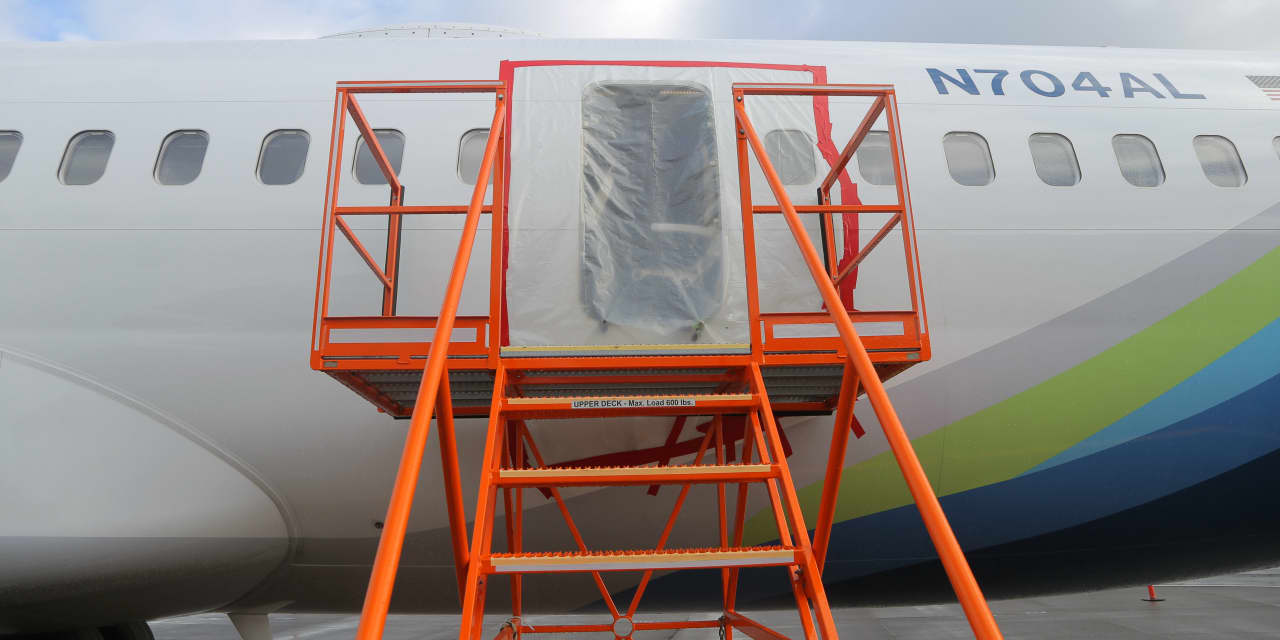Boeing
is scrambling to contain the fallout from another 737 MAX problem, leaving investors with a tough choice—buy, sell, or hold
Boeing
stock. Wall Street is defending the shares, but investors should still run through some best- and worst-case scenarios before making any decisions.
On Friday, an
Alaska Air
Boeing 737 MAX 9 lost its emergency door plug in flight—necessitating an emergency landing. The door plug is used on some MAX 9 aircraft that don’t need the emergency door because of airline seat configurations. The incident resulted in the Federal Aviation Administration grounding 171 MAX 9 jets. Alaska Air operates 65 MAX 9 jets and United Airlines operates 79 MAX 9 jets.
William Blair analyst Louie DiPalma called the accident “terrifying” in a Monday report, adding it shouldn’t have a material financial impact “unless it happens again.”
He rates shares Buy and recommends buying them on any weakness. DiPalma doesn’t have a price target for shares. A Buy rating at Blair essentially means the broker expects a stock to outperform the market.
His opinion isn’t unusual. Other analysts see a relatively small impact and don’t think this incident is as serious as the worldwide grounding of MAX jets in March 2019 following two deadly crashes. Those crashes were tied to a design flaw with new flight-control software.
“Given that the MAX-9 has been in circulation for years, this is the first incident of its kind, and the plane in question is only two months old, we think this suggests a manufacturing defect, not a design flaw,” wrote CFRA analyst Stewart Glickman in a Monday report. He rates Boeing shares Hold and has a $238 price target.
The financial impact of the March 2019 grounding was enormous and was compounded by Covid-19. Boeing spent billions building MAX jets and putting them into storage while working to recertify the plane. The company is still trying to ramp up MAX production while working through new aircraft inventory from years ago. Boeing stock was about $446 shortly before the grounding. Shares closed at $229 on Monday, dropping 8% while the
S&P 500
rose 1.4%.
As for the MAX 9 impact, Boeing will likely compensate airlines for losing passenger-carrying capacity.
Citi
analyst Jason Gursky estimates the grounding could cost Boeing about $2.3 million a day. That’s significant, but Boeing is expected to generate about $6 billion in free cash flow this year. A 30-day delay amounts to about 1% of that amount.
A “worst-case could be the FAA doing to Boeing on the MAX what it did on the 787,” noted Vertical Research Partners analyst Rob Stallard. “Pausing deliveries until they are happy that the production process is at the required quality.”
Deliveries of the 787 were halted between June 2021 and August 2022 after some manufacturing quality issues were discovered.
Stallard is a little more conservative than some of his peers, writing Tuesday that he likes the current price as an entry point for Boeing stock but would like more clarity on the MAX 9 situation before jumping in. He rates shares Hold and has a $266 price target for shares.
Seaport analyst Richard Safran is a little cautious too, but is sticking with a Buy rating. “It’s not an easy call, but we remain constructive and maintain a Buy,” he wrote Tuesday. He did reset his price target to $262 from $287, believing that MAX 9 jets might not be delivered for up to a year.
That is significant for the MAX 9, but not Boeing overall. Boeing delivers about six 787 jets a month. The company is expected to deliver two or three MAX 9 jets a month in 2024, according to Melius Research analyst Robert Spingarn, who rates share Buy with a $267 price target. The plane accounts for a relatively small portion of Boeing’s backlog.
Low volume helps limit the financial impact of any worst-case scenarios, but the “root cause [of the failure] is the key to distinguishing how significant this can be,” said Spingarn. “We won’t know until they progress further in the accident investigation.”
That could take only days in a best-case scenario, with the FAA allowing all the jets back in service once they have been inspected and any issues fixed. That would be good for shareholders but they should brace for a longer process.
The incident is another black eye for Boeing. BofA Securities analyst Ron Epstein called the incident “a worrying start to the new year,” and “another hit to [the] Boeing reputation,” in a Sunday report.
One additional issue he raised in his report was the certification of the MAX 7 and MAX 10 variants of the MAX family of jets. Those versions of the MAX aren’t certified for commercial service yet. Each variant gets a separate certification from aviation regulators. Boeing would like to deliver those jets to customers as soon as possible and it’s possible the MAX 9 issue would have an impact on that process.
Still, that isn’t enough to change his view of the stock. Epstein wrote he doesn’t expect the MAX 9 accident to affect his 2024 estimates and maintained his Buy rating and $275 price target for the stock.
Boeing stock fell 1.4% on Tuesday, closing at $225.76 a share, after its 8% decline on Monday. The S&P 500 and
Dow Jones Industrial Average
closed down 0.2% and 0.4%, respectively.
Write to Al Root at [email protected]
Read the full article here




